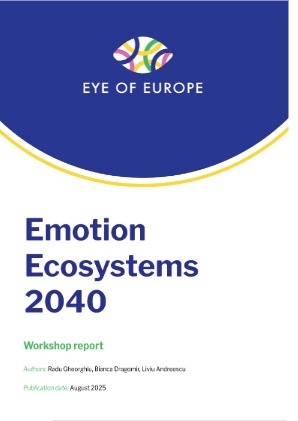Last Edited: 8 months ago
Emotion ecosystems 204024 June - 25 June 2025
“The fabric of society is woven with emotional threads, from empathy to outrage, and it is these feelings that shape both harmony and conflict in the world.” — Dalai Lama
Emotion Ecosystems 2040 — the foresight workshop hosted by Executive Agency for Higher Education, Research, Development and Innovation Funding (UEFISCDI) within the Eye of Europe project — was an inspiring, mind-expanding experience! The co-creation workshop was held on 📅24-25 June 2025 at 📌Conacul Cozieni, near Bucharest, Romania.
💡The event explored the concept of emotion ecosystems — the dynamic, interwoven emotional currents that shape our collectives, whether in communities, institutions, or digital spaces.
To capture this complexity, the event brought together voices from across Europe and from various disciplines: social psychology, psychotherapy, anthropology, philosophy, cultural history, spirituality, political science, art and the creative industries, journalism, media studies, science and technology studies, and robotics.
One portion of the workshop was dedicated to surfacing emotional tensions that mark our time:
🌀 Hyperconnection vs Isolation; 🌍Craving for unity vs Tribal polarization; 🩹 Healing collective traumas vs Solitary coping ...and many more. Using Causal Layered Analysis, participants unpacked these tensions through multiple layers — from surface narratives and systemic structures to the deeper worldviews and metaphors/myths that sustain them.
From there, each working group leaned into the future:
💡 by exploring drivers of change relevant for the tension discussed in their group, and then
💡 by discussing and proposing new metaphors, worldviews, beliefs, and systems that could soften or transform these tensions. Ultimately, the goal was to imagine what more desirable emotional futures might look like.
Posted on: 14/04/2025


